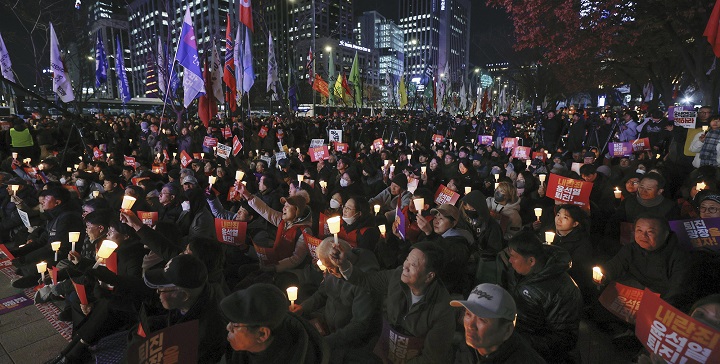
The martial law in South Korea, proclaimed and then quickly withdrawn by President Yoon Suk Yeol, has opened a new chapter for China with ramifications for Russia and the Middle East.
Over the weekend, Yoon could be forced to step down. The constitution requires a two-thirds parliamentary majority for such a move, and the opposition Democratic Party has 191 votes out of 300—only ten votes shy of a constitutionally required two-thirds majority. At least ten conservative party members would need to join the opposition to secure his resignation. Even if Yoon manages to dodge this bullet, he is politically weakened, with his approval rating below 20%.
South Korea has thus entered a period of high volatility. If the president resigns soon, there will be a 60-day period, as required by law, to call for a new election and vote for a new president. If Yoon doesn’t resign, the period of volatility could be longer.
In a time when there are two open wars (in Ukraine and the Middle East) and growing tensions in East Asia around North Korea and China, instability in South Korea could be dangerous. South Korean and American troops are on high alert, fearing Pyongyang might take advantage of the situation. However, diplomats dismiss this possibility, thinking North Korean leader Kim Jong Un might prefer Lee Jae Myung (head of the Democratic Party and future presidential candidate) as president. Lee has announced he will reopen dialogue with the North. Lee could also have the support of Donald Trump, who will start his second term as US president on January 20. Trump has stated he intends to restart dialogue with Pyongyang.
This scenario is favorable for Kim but not necessarily for Russian President Vladimir Putin or Chinese President Xi Jinping, who may not welcome increased diplomatic maneuvering when Kim talks to Trump and Lee. Kim could then either break free from his old allies or demand a higher price for his new and old allegiances.
It creates a new set of possibilities for China and Russia. China has been North Korea’s main economic and political ally for decades. It favored the six-party talks in the early 2000s (together with the US, Russia, Japan, South and North Korea) to improve its own dialogue with the United States. But as US ties worsened, so did Chinese enthusiasm for the talks.
There’s a rumor that during the Obama administration, North Korea reached out to the US several times, possibly without China’s approval, only to be rebuffed. In his first term, Trump had a summit with Kim, and although no agreement was reached, channels of dialogue were opened. Kim would likely try to reconnect with Trump and Lee.
China has roughly three choices: favor the contacts, oppose them, or remain neutral. If it remains neutral, it might be the worst option. In 1950, China intervened in the Korean War and gave up on pursuing the KMT nationalists fleeing to Taiwan. The island has remained a sore point in domestic and international politics. If Kim establishes even simple lines of communication with the US, China could lose its foothold in Korea without resolving the issue of Taiwan.
If China opposes the contacts, Pyongyang could resist Chinese influence and create trouble. If it favors the contacts, it could benefit from a general improvement, build initial trust with Trump, and have more room for discussion with Russia. There are pros and cons to each option.
Russia could have different choices. Improving relations between North and South Korea could mean dwindling arms and personnel supplies for fighting in Ukraine. North Korea has sent 12,000 troops to Ukraine and massive provisions of shells and missiles. Plus, China might pull back from supporting Russia, particularly with potentially warmer US ties.
Russian military forces are already overstretched in Ukraine. In Syria, its Tartus base is under siege by anti-government forces backed by Turkey. If North Korea partially withdrew its support in exchange for warmer ties with the US and China became more lukewarm, things could turn sour for Russia in Ukraine.
Iran could suffer, too. If Syria, ruled by President Bashar Al-Assad, falls, Iran would lose a significant ally, and all its other assets could be endangered. Conversely, Russia could also favor new contacts between the two Koreas, improving its talks with the US and pushing North Korea to raise its demands to a level impossible for Washington or Seoul. Conversely, Russia could try to destabilize South Korea or other US interests to undermine future talks. In short, Putin has been very creative in the past and may be in the face of the new Korean situation.
While there are reasons for optimism, we must not overlook another significant signal from the martial law in Seoul. Yoon’s move was surprising and unexpected in a developed country, suggesting anything could happen anywhere, even where it seems impossible. The developed world should be vigilant, as similar episodes undermine the value of democracy. Political instability in Europe, with several ambitious, radical parties, could be an issue.
Another lesson might come from Israel. The October 7 massacre occurred after a year of fierce internal fights in the country, and the confusion favored Hamas’s plans. The current South Korean confusion, which could last about two months in the best-case scenario, offers a chance for anything to happen in the region.
I am grateful to Seonghyon Lee and Korean diplomats for their help.
In cooperation with Appia Institute.






